Wines by Joseph, Food by Lidia
The Wine Media Guild holds its monthly tastings at Felidia Restaurant, but I had a feeling our November meeting was going to be special. Joseph Bastianich was going to speak about his wines and his mother Lidia, the owner of Felidia, was preparing a meal to match the wines. As Co-Chair of the Wine Media Guild, it was my pleasure to introduce them. I could have spoken for some time listing their many restaurants, wineries, and the awards they have received, but with all the good food and wine waiting for us, I made it as short as I could.
We started with a stand up tasting of the wines from Azienda Agricola Bastianich founded by Lydia and Joseph in 1997 in the Colli Orientali del Friuli and the wines of La Mozza in the Maremma in Tuscany established by Joseph, Lidia and Mario Batali in 2001.
The wines I liked best in the stand up tasting were:
the Bastianich Friulano 2007 DOC ($16. 95) (It can no longer be called Tocai as of the 2007 vintage); the La Mozzal Perrazi Morellino di Scansano DOCG 2007, made from 85% morellino (sangiovese), 5% syrah, 5% alicante, 3% ciliegiolo, and 2% colorino ($18.95); and the La Mozza Aragone IGT 2006($ 39.95). Joseph called this blend of Mediterranean grapes his “Super Med”. It is made with 40% sangiovese (Tuscany), 25% syrah (Southern France), 25% Alicante (Spain), and 10% carignan.
Joseph arranged for a sit down tasting of the rest of the wines so that he could speak about them as we tasted and we could drink them with food. The wines were: Bastianich Vespa Bianco 2001, 2002, 2004, 2006($ 39. 95) and 2007. The Biastanichi Tocai Plus 2003 & 2005($80.95) from Magnums and the Bastianich Vespa Rosso 2002, 2004 & 2005 ($ 39.95)
When Joseph began to speak I was struck by the great passion that he has for his wines. At one point he even said that he gets more gets more fulfillment and pleasure from his wines then he does from his restaurants. He gave a very interesting and informative talk.
The Vespa (Wasp in Italian) Bianco DOC is made from a blend of 45% chardonnay, 45% sauvignon blanc, and 10% picolit (late harvest). He pointed out, however, that the percentages changed according to the vintage and that it was a field blend.
I was most impressed by these wines and was interested in what Joe had to say.
2001 was a warm year and Joe felt that the wine had good minerality, with aromas of clove, honey, and pear which were a constant in all these wines. I found hints of olives and anise and it had good finish and aftertaste. He also pointed out that the wine was eight years old and may have had a little hint of oxidation in the finish. I did not find this to be the case.
2002 -- There was a lot of rain this year and he felt that as a result there were more ripe fruit flavors and aromas in the wine.
2004-- This was my favorite wine of the tasting. Joe said that the weather conditions were very good and it showed in the wine. It is a very elegant wine, well balanced with good fruit and acidity. It had a long finish and a great aftertaste. He said that the wines would last between 7-10 years after the vintage. I felt that this vintage would last longer. I did not just taste this wine but drank it with the Insalata di Polipo (Octopus salad with warm potato and onion). it was a perfect combination.
2006-- He said that this vintage was more typical of their style and it had more Chardonnay. It was aged in large new barrels and because the barrels were new it had an oaky taste. Joe found it to have coconut aromas and flavors because of the new wood.
2007 -- Joe felt that this wine was more aromatic and had a lot of sauvignon blanc characteristics. I also enjoyed the wine; with the Ravioli Ripieni con Cacio e Pere (Pear and fresh pecorino-filled ravioli with aged pecorino, finished with crushed pepper).
After tasting these wines I understand why they are the flagship wines of the Bastianich estate and they are great food wines
He also said that they were no longer going to use stainless steel or barriques for these wines. All the wines would be fermented and aged in large oak barrels. I could not agree more!
Tocai Plus DOC is 100% Friulano (Tocai) 90% is late harvest and 10%
appassimento (dried grapes). The grapes come from a single vineyard of 60 year old vines. Joe said that harvesting takes place as much as a month late and that they hoped for botrytis (noble rot). It is aged in large oak barrels.
2003 & 2005 these were both big wines, reflecting the way in which they were made.
They had similar characteristics and Joe said that he always found aromas and flavors of orange peel. I did find candied flavors and aromas with hints of pear and melon. Both had very pleasant finishes and aftertastes. I would drink them with “soft” cheese.
Vespa Rosso DOC 50% Merlot, 30% Refosco, 15% Cabernet Sauvignon and 5%
Cabernet Franc 2002, 2004 & 2005. Joe said that these wines were very fruit forward, yet they retain many of the spicy earthly notes that characterize Friulian reds. I enjoyed these wines with Il Manzo (Roasted all-natural angus beef flat iron with mushrooms, with sliced hanger steak tagliata, and swiss chard and potatoes).
Joe concluded that he likes to use native grapes for his wines but does use some “international” varieties. He pointed out that though Merlot, Cabernet Sauvignon, Cabernet Franc and Sauvignon Blanc were not “native” they were brought to Friuli over two hundred years ago by Napoleon so they have a long tradition here.
Michele and I will be teaching at a class on Italian Food and Wine at De Gustibus at
Macy's on Thursday Dec 3 2009 21-239-1652






























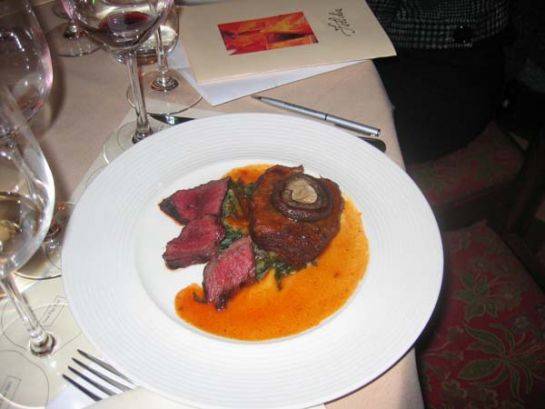
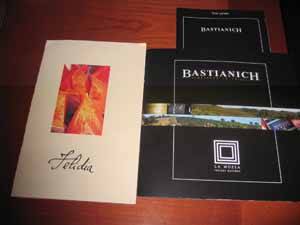
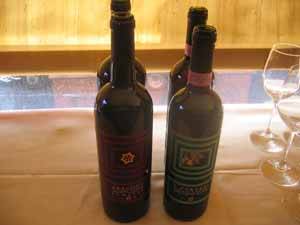
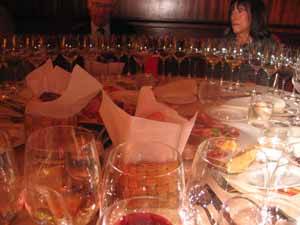
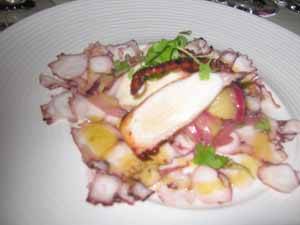
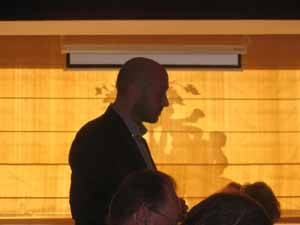
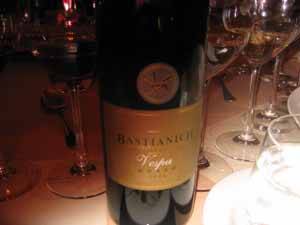



i-Italy
Facebook
Google+
This work may not be reproduced, in whole or in part, without prior written permission.
Questo lavoro non può essere riprodotto, in tutto o in parte, senza permesso scritto.